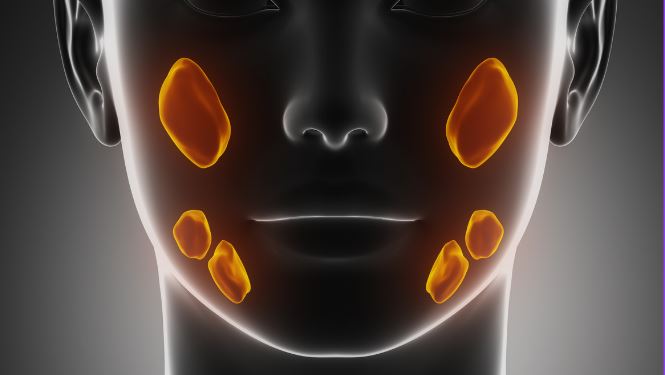Mr Cameron Davies-Husband
Consultant ENT
Specialist expertise: Head and Neck, Rhinology, Head and Neck Surgery, Ear, Nose and Throat.
Disorders of the larger salivary glands are more common than the minor ones. Most occur in the parotid glands, which sit just in front of the ear behind the jaw bone on each side of the face. Find out more here.

What are the Salivary Glands?
The salivary glands produce saliva in the mouth. The major named glands include the parotid, submandibular and sublingual glands. The hundreds of minor salivary glands dispersed throughout the mucous lining of the mouth, nose and throat produce most of the saliva in the mouth and throat.
What are Salivary Gland Disorders?
Disorders of the larger salivary glands are more common than the minor ones. Most occur in the parotid glands, which sit just in front of the ear behind the jaw bone on each side of the face. There are however a variety of salivary gland disorders including swelling and duct blockage from infection, inflammation or tumour.
Common symptoms associated with salivary gland problems include:
Symptoms that raise concern about cancer include the inability to open the mouth (trismus), weakness in the facial and eye opening muscles, tongue numbness or reduced tongue mobility.
The salivary glands may be involved as part of a more generalised disorder with additional non-specific symptoms such as fever and joint pain.
Depending on the potential cause, the following investigations may be requested during your visit:
This is likely to be multidisciplinary. In general, all salivary gland disorders benefit from attention to good oral hygiene with antiseptic mouthwash and fluid hydration by drinking plenty of water throughout the day.
Antibiotics may be necessary for acute bacterial infections. Admission to a ward for intravenous antibiotics and rehydration may be necessary in severe cases. Surgical drainage is reserved for abscesses (pus-filled collections) that do not improve with medical management.
Inflammatory conditions such as Sjogren’s syndrome, sarcoidosis and granulomatosis with polyangiitis, will require specialist treatment by a rheumatologist who may commence you on powerful anti-inflammatory immune suppressive drugs.
Rarely, chronic inflammation causing severe symptoms that does not respond to medical treatment will require surgical excision of the affected salivary gland.
A small stone that blocks a salivary duct may be able to be retrieved via sialography as described above but may require a local surgical procedure for extraction if too big. If a symptomatic stone is embedded within a gland, surgical excision of the whole gland may be required.
Any diagnosed cancerous growths of a salivary gland must be managed only after discussion in a dedicated head and neck cancer multidisciplinary team meeting. Treatment of both benign and malignant salivary gland tumours is by surgical excision. The extent of surgical excision is likely to be greater for malignant growths to ensure complete clearance. More aggressive cancer growth may also require postoperative radiotherapy.
It is critically important in salivary gland surgery to identify and preserve the major nerves and their branches that are intimately related to the gland. For the parotid this is the facial nerve which is responsible for closing the eye, facial symmetry and smiling. A deficit in one or more branches of the facial nerve can cause severe functional and cosmetic problems.
We are an experienced group of ENT head and neck surgeons, who regularly perform surgery for complex salivary gland disorders and cancers in our NHS and private practice. We routinely use nerve monitoring to identify and preserve critical nerves during all such procedures.
Currently selected day
Available consultations
Symptoms
Dry mouth, tooth decay, mouth sores, enlarged sa...
Tests
X-ray, CT scan or MRI
Treatments
Surgery
All our private ENT specialists at OneWelbeck in London are leaders in their sub-specialties, providing the highest quality treatment to ensure you receive the best available care.